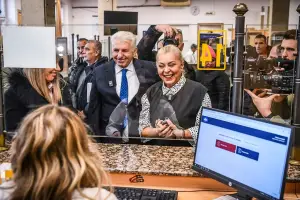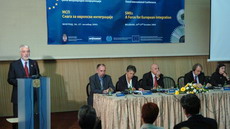- Serbia
Get to know Serbia
- Citizens
Culture and science
Health services
Pension and disability insurance
- Business
Employment
Economy
- Media
- Government
- Contact
Keep in touch
Contact form
Back
Keepin touch
Whether you have a question, comment, suggestion or any problem in the purview of the government, send us your message and we will try to respond as soon as possible. If your problem is not in our purview, we will forward your message to the relevant institution.
Q:
A:
Serbia will do everything to help SMEs improve their business
Belgrade,
26 October 2005
Serbian Deputy Prime Minister Miroljub Labus said today that economic development cannot occur without the development of small and medium-sized enterprises (SMEs), adding that Serbia will do everything to improve business in this sector.
At the opening of the third international conference on SMEs themed “Small and Medium-Sized Enterprises – The Driving Force of EU Integration”, Labus said that Serbia is working on reducing the number of people employed in administration and the number of licences needed for starting businesses. It is also trying to improve the system of mortgages and pledges, and to provide opportunities for a speedy transfer to another business activity.
The government is also trying to cut the costs of opening these types of businesses and to improve the legal system so as to protect creditors in the best possible way, Labus said and added that the reduction of procedures in foreign trade is another task Serbia will take upon itself to solve.
He stressed that as a result of these actions, the problem of unemployment, which is a structural problem in Serbia, can be solved.
The government is also working on an initiative to enable a transformation of all bilateral contracts on free trade between countries in the region into a single contract. A free trade zone with 50 million consumers will thus be achieved, Labus explained.
Representatives of the Western Balkan countries, Moldova and the European Commission signed today a Belgrade declaration on the European Charter on small enterprises.
Serbian Minister of Economy Predrag Bubalo marked this as a political act that shows intentions of both the region and Moldova to continue promoting development in the small enterprises sector alongside the European Commission and according to principles of the European charter on small enterprises from the year 2000.
Bubalo stressed that in the process of transition and EU accession, a competitive economy should be set up, one that will be able to compete with economies of EU member states. As he pointed out, the implementation of the European charter on small enterprises represents a part of that process.
He expressed expectation that by the end of 2005, around 10,000 SMEs would be established, more than doubling last year’s figure of 4,600.
According to Bubalo, this is regarded as a great success compared to the former annual record in setting-up SMEs, which is 6,800 companies.
Bubalo said that Serbia’s access to the European market has only this year started to yield positive results, such as the increase of export, while better results on the regional level could be expected only after the signing of a unified agreement on free trade between the countries in the region.
The government is also trying to cut the costs of opening these types of businesses and to improve the legal system so as to protect creditors in the best possible way, Labus said and added that the reduction of procedures in foreign trade is another task Serbia will take upon itself to solve.
He stressed that as a result of these actions, the problem of unemployment, which is a structural problem in Serbia, can be solved.
The government is also working on an initiative to enable a transformation of all bilateral contracts on free trade between countries in the region into a single contract. A free trade zone with 50 million consumers will thus be achieved, Labus explained.
Representatives of the Western Balkan countries, Moldova and the European Commission signed today a Belgrade declaration on the European Charter on small enterprises.
Serbian Minister of Economy Predrag Bubalo marked this as a political act that shows intentions of both the region and Moldova to continue promoting development in the small enterprises sector alongside the European Commission and according to principles of the European charter on small enterprises from the year 2000.
Bubalo stressed that in the process of transition and EU accession, a competitive economy should be set up, one that will be able to compete with economies of EU member states. As he pointed out, the implementation of the European charter on small enterprises represents a part of that process.
He expressed expectation that by the end of 2005, around 10,000 SMEs would be established, more than doubling last year’s figure of 4,600.
According to Bubalo, this is regarded as a great success compared to the former annual record in setting-up SMEs, which is 6,800 companies.
Bubalo said that Serbia’s access to the European market has only this year started to yield positive results, such as the increase of export, while better results on the regional level could be expected only after the signing of a unified agreement on free trade between the countries in the region.
-
 Belgrade, 19 January 2026
Belgrade, 19 January 2026Deal reached on key provisions of NIS sale and purchase agreement
-
 Belgrade, 16 January 2026
Belgrade, 16 January 2026More than one-third of Growth Plan funds directed to energy sector
-
 Belgrade, 15 January 2026
Belgrade, 15 January 2026Goal to finalise NIS negotiations by end of week
-
 Belgrade, 23 December 2025
Belgrade, 23 December 2025Enhancing implementation of IPARD III programme
-
 Belgrade, 12 December 2025
Belgrade, 12 December 2025Construction of gas interconnector with North Macedonia by end-2027
-
 Belgrade, 8 December 2025
Belgrade, 8 December 2025Enormous public interest in registering illegal facilities
-
 Belgrade, 8 December 2025
Belgrade, 8 December 2025State doing everything to preserve stability of energy supplies
-
 Belgrade, 5 December 2025
Belgrade, 5 December 2025State doing everything to avoid shortage of oil derivatives
-
 Belgrade, 2 December 2025
Belgrade, 2 December 2025Serbia has not received positive decision from US over NIS
-
 Belgrade, 2 December 2025
Belgrade, 2 December 2025Spanish companies invited to invest in Serbian agriculture


